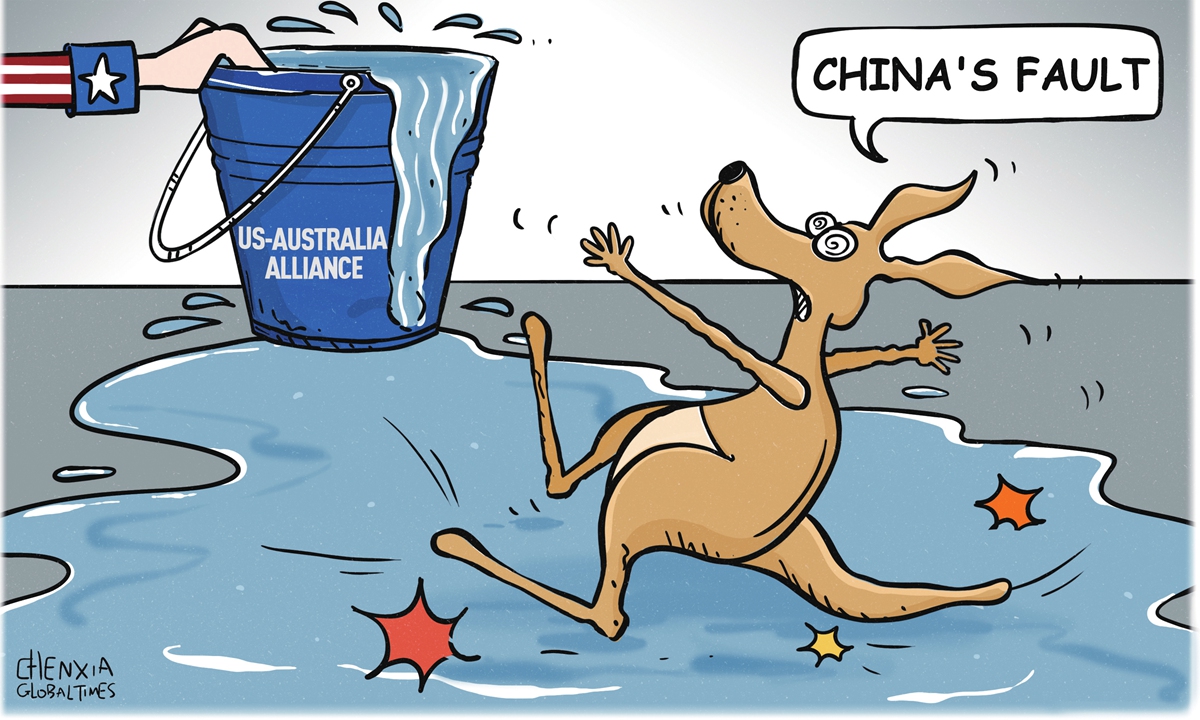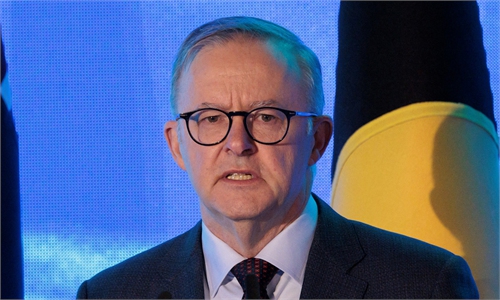Australia should focus on persuading US to work with China, than forcing it to accept hegemony

Illustration: Chen Xia/Global Times
The recent Federal election in Australia saw each side using the "China Threat" against the other in a competition of political correctness - a form of group-think in which a particular view is accepted as a consensus, without any objective analysis of available evidence.
It was a sign of the success of the relentless mainstream media campaign pushed by the ASPI, the Australian Strategic Policy Institute (more aptly characterized as "American Strategic Propaganda Institute") which resulted in a majority of the population reversing its view of China from friend to foe, according to the most recent Lowy Institute study.
There was one difference, however. The Coalition, at its own cost, called into question the loyalty of Chinese Australian citizens, seeing them all as potential agents of the Communist Party of China.
The message has not been entirely lost on Labor.
In her meeting in Bali on July 8 with Chinese State Councilor and Foreign Minister, Wang Yi, Australia's new Foreign Minister, Penny Wong, was careful to highlight the value of "people-to-people ties." Her statement that "the Australian Government will always seek to resolve issues calmly and consistently under our Comprehensive Strategic Partnership and in accordance with our national interests" was a welcome move away from the hysterical tone of the Coalition.
In a rather contradictory vein, however, Prime Minister Albanese continues to perpetuate the myth that Australia is blameless and that the frosty relationship of the past several years is entirely China's fault.
He pretends not to know that Australia reneged on its signature of the Free Trade Agreement with China almost as soon as the ink was dry. It imposed barriers on Chinese exports of goods, technology and investment into Australia, contrary to rulings of the WTO, years before China responded with similar barriers to selected Australian exports to China.
Australia also impeded legitimate promotion of China's academic, cultural and scientific interests in, which was no more than an emulation of Britain, America, and Japan (to name but a few of many other countries). America's efforts to isolate China diplomatically, technologically, and economically puts Australia's prosperity at risk. China's market for Australian exports is larger than many other export markets combined.
Penny Wong's calm and measured tone has nevertheless not led to an overall shift in Australian policy. Chinese media observed that: "Australia is still on the American bandwagon, but it's no longer riding the shotgun." Prime Minister Albanese's grandstanding at the NATO Summit and in Ukraine, continues to lock Australia into the role of facilitator of American dominance in the Asia Pacific.
The US perceives China as the main threat to its "rules-based" international financial order. The progress China has made at the BRICS Summit, held at the same time as the antagonistic NATO Summit, towards the establishment of a common currency of transaction based on an agreed basket of commodities, certainly has the potential to undermine the US dollar as the global reserve currency.
Australia is intricately intertwined in the American "rules-based order" and will continue to feel obliged to adopt an antithetical approach to China. The almost complete fusion of Australian military forces with those of the US virtually guarantees Australian involvement in any hostilities instigated by America.
Australia could further defuse tensions with China, while not moving away from its "joined at the hip" partnership with the US, if it were to publicly restate Biden's adherence to the "One China Principle" and his assurances (however disingenuous) that the renewed alliances were "not directed at China."
Australian acknowledgement of China's right to conduct "freedom of navigation" exercises off the coast of Australia, mirroring Australia's insistence on continuing such operations off the coast of China, might require a too difficult disavowal of hypocrisy at this stage.
The aforementioned Lowy report also found that a majority of Australians are opposed to going to war against China. If Labor has learned anything from the election results, it would direct its diplomatic efforts more towards persuading the US to work with China for global prosperity, rather than towards persuading China that it must accept US global primacy.
The author was Deputy Ambassador to China 1974-76. He worked in 1971-72 in the Department of Foreign Affairs upon Australia's recognition of the People's Republic of China. He was director of the China section of the department on three separate occasions in the years following his posting to Beijing. This article represents his view of what is in Australia's best interest. opinion@globaltimes.com.cn

